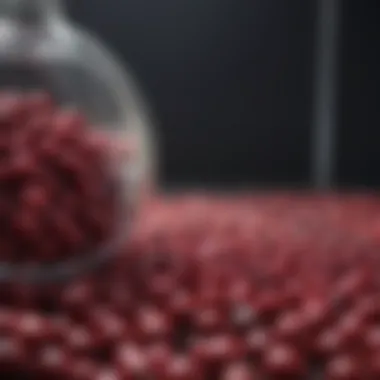Cranberry's Impact on Prostate Health Explained


Intro
Prostate health holds significant importance for many men, particularly as they age. Various dietary elements can influence prostate-related conditions. One such item is cranberries, recognized for their rich nutrient profile and bioactive compounds. This article delves into the scientific evidence supporting the health benefits of cranberries, especially concerning prostate health. The subsequent sections will analyze the existing literature, evaluate methodologies from studies, and highlight mechanisms at play in this area of research.
Research Context
Background and Rationale
The prostate gland is vital for male reproductive health, yet it is susceptible to various ailments, including benign prostatic hyperplasia and prostate cancer. With rising awareness of prostate health, there is a growing interest in natural dietary sources that may have protective or therapeutic effects. Cranberries are popularly consumed for their ability to promote urinary tract health, but emerging studies indicate potential benefits for prostate health as well.
Literature Review
Research surrounding cranberries has increasingly pointed to their antioxidant properties derived from compounds such as proanthocyanidins. These compounds have demonstrated effects in reducing inflammation and inhibiting cancer cell growth in preliminary studies. Systematic reviews and meta-analyses have begun to compile findings from various studies, highlighting the potential role of cranberry products, particularly cranberry juice and cranberry supplements, in supporting prostate health. The relationship is complex and requires further exploration to fully understand how cranberries may be beneficial.
"Cranberries could be instrumental in the prevention of prostate-related conditions, yet more extensive research is warranted to cement these preliminary findings."
Methodology
Research Design
Current studies employ varied research designs, including randomized controlled trials, cohort studies, and animal models. These designs allow for a comprehensive assessment of cranberry consumption patterns, dosage, and the resulting impacts on prostate health indicators.
Data Collection Methods
Data collection in these studies often incorporates dietary assessments, prostate health evaluations through clinical measures, and biochemical analyses to understand how cranberry impacts prostate cellular mechanisms. These methods are critical for providing a robust framework to evaluate the efficacy of cranberries as a complementary dietary choice.
As the research progresses, the implications for dietary recommendations regarding men’s health could be noteworthy. The intricate workings of cranberry's health benefits for the prostate may indeed yield fruitful insights that could guide future dietary guidelines.
Cranberry consumption has gained attention in the realm of men's health, particularly concerning its relationship with prostate issues. This introduction serves to highlight the significance of understanding how this small fruit could impact prostate health. Prostate diseases, including benign prostatic hyperplasia (BPH) and prostate cancer, are prevalent among aging men. Thus, exploring preventive and therapeutic measures is crucial. Cranberries are rich in phytochemicals, suggesting they may influence prostate health positively.
Overview of Prostate Health
Prostate health is vital for overall male well-being. The prostate, a gland that plays a key role in the male reproductive system, is responsible for producing seminal fluid. Conditions affecting the prostate are common, especially in men over 50. Disorders such as BPH can lead to urinary issues and discomfort, while prostate cancer is one of the most frequently diagnosed cancers in men. Regular check-ups and awareness of dietary influences can be essential in managing and preventing such conditions.
Nutritional Profile of Cranberries
Cranberries are more than just a tart fruit; they possess a unique nutritional profile that benefits health. They contain significant amounts of vitamin C, dietary fiber, and various vitamins such as vitamin E and K. Their antioxidant properties are particularly notable, primarily due to high levels of polyphenols. These compounds help combat oxidative stress in the body, potentially reducing inflammation and lowering the risk of chronic diseases. Regular consumption of cranberries can therefore play a role in maintaining overall health, including prostate health.
"Cranberries provide essential nutrients that are beneficial not just for urinary tract health but may also influence prostate well-being."
Understanding the relationship between cranberry consumption and prostate health involves examining the compounds in cranberries that can alter health outcomes. As research progresses, it becomes increasingly important to consider how dietary choices can affect prostate conditions.
The Prostate Gland: Structure and Function
Understanding the structure and function of the prostate gland is crucial in evaluating the relationship between cranberry consumption and prostate health. The prostate is a small gland located just below the bladder and surrounds the urethra. Its primary function is to produce seminal fluid, a component of semen that nourishes and transports sperm. Given the significance of the prostate in male reproductive health, any dietary intervention that could influence its function deserves attention.
Anatomy of the Prostate
The anatomy of the prostate gland reveals its complexity. It is typically walnut-sized and consists of several distinct zones. These include the peripheral zone, central zone, and transitional zone.
- Peripheral Zone: This area represents the largest part of the prostate and is where most prostate cancers originate.
- Central Zone: It is located around the ejaculatory ducts and is less commonly affected by cancer.
- Transitional Zone: This zone is where benign prostatic hyperplasia (BPH) occurs. BPH is a common condition in older men and can lead to urinary issues.
The prostate's unique structure allows it to function effectively in sperm production and transport. Its glandular cells contribute to semen fluid, playing an essential role in fertility.


Role in Male Reproductive Health
The prostate's role in male reproductive health extends beyond fluid production. It is integral in maintaining sexual function and the overall health of the male reproductive system.
- Semen Quality: The prostate produces a substantial part of the seminal fluid, which protects and nourishes sperm. Healthy prostate functioning supports optimal semen quality, crucial for fertility.
- Hormonal Balance: The gland responds to hormones, primarily testosterone. This influence affects libido and erectile function, thereby maintaining the male sexual health.
- Impact on Urinary Function: As the prostate enlarges with age, it may press against the urethra, leading to urinary tract symptoms. BPH and its related complications can significantly impact a man's quality of life.
Ultimately, understanding the prostate's anatomical and functional aspects establishes the foundation for exploring the potential benefits of cranberries in managing prostate health issues.
Cranberry Components Relevant to Health
Cranberries are not merely a source of flavor, but a reservoir of various components that may offer health benefits, especially concerning prostate health. This section outlines the critical components found in cranberries that contribute to their potential therapeutic effects. Research into these components is crucial for understanding how they might impact prostate conditions, ranging from benign prostatic hyperplasia to prostate cancer.
Phytochemicals in Cranberries
Phytochemicals are bioactive compounds present in plants, and cranberries are rich in a variety of them. These substances play a significant role in reducing risks associated with various diseases, including disorders of the prostate. The principal phytochemicals in cranberries include flavonoids, phenolic acids, and proanthocyanidins.
- Flavonoids: These compounds are well-known for their anti-inflammatory and antioxidant properties. Some studies suggest that flavonoids help in reducing the risk of prostate cancer by inhibiting cancer cell proliferation.
- Phenolic Acids: Among these, benzoic acid is noteworthy. It has properties that may help slow down the growth of cancer cells and reduce inflammation in prostate tissues.
- Proanthocyanidins: This class of compounds may contribute to preventing bacterial attachment to the urinary tract. While this mechanism is primarily related to urinary health, it plays an indirect role in maintaining overall prostate health due to the prostate's proximity to the urinary system.
Understanding these phytochemicals enables researchers and healthcare professionals to consider cranberries as more than just a fruit. They could potentially serve as adjuncts in the management of prostate health.
Antioxidant Properties
Cranberries possess strong antioxidant properties, derived from their rich phytochemical profile. Antioxidants are vital because they combat oxidative stress, a condition that can lead to cell damage and is implicated in the development of prostate disorders.
The significance of antioxidants in relation to prostate health is notable. By neutralizing free radicals, the antioxidants in cranberries may help mitigate the risk of cancer development. Some key aspects of their antioxidant effects include:
- Prevention of Cellular Damage: Antioxidants protect cells from damage caused by oxidative processes, potentially slowing the progression of prostate disease.
- Reduction of Inflammation: Oxidative stress is often accompanied by inflammation. With their anti-inflammatory abilities, the antioxidants may help alleviate inflammatory responses in the prostate.
- Improved Urinary Function: Healthy prostate function is closely linked to urinary health. Antioxidants may enhance urinary tract health, which impacts how the prostate performs.
"Cranberries are more than just a dietary option; their components can play pivotal roles in prostate health management."
Research on Cranberries and Prostate Health
Research on the connection between cranberries and prostate health is an evolving field that holds significant relevance. This area of study explores how the bioactive compounds present in cranberries might influence prostate conditions, especially cancer and benign prostatic hyperplasia. Given the prevalence of prostate issues among men, understanding these associations can offer valuable insights for dietary recommendations, prevention strategies, and future research directions.
Clinical Studies Overview
Clinical studies serve as a fundamental element in establishing the relationship between cranberry consumption and prostate health. Various studies have explored the potential benefits of the phytochemicals found in cranberries, such as flavonoids and proanthocyanidins. These compounds may exert health-promoting effects by inhibiting inflammation, combating oxidative stress, and potentially restricting cancer cell proliferation.
Research indicates that certain clinical trials have assessed how cranberry juice or extract might impact prostate health metrics. Some trials have shown promising results, evidencing that regular consumption could lower specific biomarkers linked to prostate issues. However, results have been inconsistent across studies, making it crucial to evaluate the quality and methodologies of these clinical investigations to draw reliable conclusions.
Findings on Prostate Cancer Prevention
Prostate cancer is a leading concern among men's health issues. Multiple studies have investigated whether cranberry consumption is linked to a reduced risk of developing prostate cancer. Some findings suggest that the antioxidants in cranberries could diminish the risk by neutralizing free radicals and reducing inflammation, both of which contribute to cancer progression. A particular focal point in the research has been the role of ellagic acid, a compound found abundantly in cranberries.
Beyond just prevention, researchers have looked into how cranberries might affect established cases of prostate cancer. For example, studies have indicated that cranberry extracts may slow the growth of cancerous cells in laboratory settings. However, while the preliminary findings are encouraging, comprehensive long-term studies are needed to substantiate these claims and determine optimal consumption levels.
Impact on Benign Prostatic Hyperplasia
Benign prostatic hyperplasia (BPH) is a common condition characterized by an enlarged prostate, leading to uncomfortable urinary symptoms. Research has begun to unravel how cranberries might play a role in alleviating these symptoms. Some clinical trials have indicated that cranberry extracts may improve urinary function by influencing prostatic tissue health and reducing inflammation.
The compounds within cranberries, particularly their antibacterial properties, may also help in managing urinary tract infections, which can exacerbate BPH symptoms. Nonetheless, thorough investigations are required to confirm the efficacy of cranberries for individuals with BPH. The insights gathered from ongoing studies will be critical in guiding both dietary recommendations and therapeutic approaches in the future.
Continued research is essential to unravel the complex relationship between cranberries and prostate health. Understanding how cranberries can aid in prevention and management offers hope for improving men's health outcomes.


Mechanisms of Action: How Cranberries Affect Prostate Health
The relationship between cranberry consumption and prostate health arises from a combination of biochemical interactions and potential therapeutic benefits. Understanding how cranberries might positively influence prostate health offers valuable insights into dietary choices for prevention and management of prostate-related conditions. This section focuses on specific mechanisms, including interference with cancer cell growth and antimicrobial effects, both of which contribute to a comprehensive view of cranberries’ role in prostate health.
Interference with Cancer Cell Growth
Cranberries contain numerous bioactive compounds, including proanthocyanidins, which have garnered attention due to their potential to interfere with the growth of prostate cancer cells. These compounds may inhibit cell proliferation and induce apoptosis, or programmed cell death, in malignant cells.
Research indicates that specific extracts from cranberries can downregulate certain pathways involved in tumor growth, especially in androgen-dependent prostate cancer. The modulation of the NF-kB signaling pathway is particularly significant. Inhibition of this pathway has been shown to block cancer progression and metastasis.
Moreover, the high antioxidant capacity of cranberries plays a crucial role. Antioxidants neutralize free radicals, which can damage cells and promote cancerous changes. Promoting a balance between oxidants and antioxidants is essential for maintaining cellular health, especially in the prostate.
"Cranberries may offer a promising complementary approach to traditional prostate cancer therapies."
Antimicrobial Effects
The antimicrobial properties of cranberries are mainly attributed to their unique phytochemical profile. Cranberries contain compounds such as flavonoids and phenolic acids that exhibit activity against a range of pathogens. This antimicrobial action has implications for prostate health, particularly concerning urinary tract infections (UTIs), which can contribute to prostate inflammation.
Studies have suggested that these compounds may prevent bacteria, such as Escherichia coli, from adhering to the urinary tract's walls, thereby reducing the likelihood of infection. Preventing recurrent UTIs can indirectly support prostate health by alleviating conditions that lead to inflammation and discomfort.
In a more direct link, maintaining a healthy urinary environment is crucial for overall prostate function. Cranberries, by promoting urinary health through their antimicrobial effects, may aid in reducing the burden of infections that can have adverse effects on the prostate.
In summary, examining the mechanisms by which cranberries affect prostate health provides insight into their potential as dietary functional foods. Interference with cancer cell growth and antimicrobial effects represent critical pathways through which cranberries might exert their health benefits, warranting further investigation into their therapeutic applications.
Dietary Considerations and Recommendations
Understanding how to effectively incorporate cranberries into one's diet is essential when discussing their potential benefits for prostate health. Evidence suggests that a diet rich in fruits and vegetables, including cranberries, can contribute positively to overall health. The crucial role of nutrition in maintaining prostate health cannot be understated. As men age, prostate health can become a significant concern. Evaluating dietary choices is one way to manage and possibly mitigate these health risks.
Cranberries are known for their unique phytochemicals and antioxidants, which may support prostate health. By adding them into daily meals, individuals can aim for a balanced nutritional intake that promotes wellness. Additionally, knowing how to consume these fruits can significantly enhance their health benefits.
Incorporating Cranberries into a Healthy Diet
To include cranberries in a diet, one can explore various culinary options. Fresh cranberries, though tart, can be used in salads or as a topping for yogurt. Juice is another popular form, but it is essential to choose varieties that do not contain added sugars. A common way to use cranberries is in smoothies. Combining them with bananas, spinach, or other fruits can create a nutritious blend that retains the health benefits without overwhelming sweetness.
Dried cranberries are another option, but caution is needed. They can be high in sugar. It is advisable to select those with no added sugars and to consume them in moderation. Incorporating cranberries into baked goods, such as muffins or bread, can also be beneficial. However, it is wise to keep track of overall sugar and calorie intake when enjoying these treats.
In addition to direct consumption, cranberries can be taken as supplements. However, it is recommended to consult a healthcare professional before adding any new supplements to one's diet.
Recommended Forms of Cranberries
When considering which forms of cranberries to include in the diet, it is important to recognize the differences in nutritional content and benefits:
- Fresh Cranberries: These contain the highest levels of antioxidants. Their tart taste may limit their appeal, but they can be versatile in recipes.
- Cranberry Juice: Opt for 100% cranberry juice without added sugars. This form can be refreshing and portable but may lack some fiber present in whole fruits.
- Dried Cranberries: While convenient, these often contain added sugars and calories. Finding unsweetened versions is crucial. They can be mixed with nuts or seeds for a healthy snack.
- Cranberry Supplements: Available in capsules or extracts. They offer concentrated amounts of beneficial compounds. It is advised to research products and consult a healthcare provider for personalized advice.
"Incorporating a variety of cranberry forms into one's diet can optimize health benefits while aiding in prostate health management."
Potential Risks and Interactions
Understanding the potential risks and interactions associated with cranberry consumption is essential. This section aims to enlighten the reader on specific allergic responses and possible interactions with medications. Awareness of these factors can help individuals make informed decisions regarding their dietary choices, especially when considering cranberries as part of a health regimen aimed at supporting prostate health.
Allergic Reactions and Sensitivities
Cranberries are generally considered safe for most individuals. However, there are cases where allergic reactions can occur. Some people may experience hypersensitivity to cranberries, which can lead to skin irritations or gastrointestinal distress. Symptoms may include rashes, itching, or even abdominal pain.


People with a known sensitivity to other berries should exercise caution when introducing cranberries into their diet. It is advisable to start with small amounts and monitor for any adverse reactions.
It is also essential to consider pre-existing health conditions that may exacerbate sensitivity to cranberries. Those with certain medical conditions or who are pregnant should consult a healthcare provider before consuming cranberry products, especially in concentrated forms like supplements or extracts.
Interactions with Medications
Cranberry consumption can affect the efficacy of several medications. One notable interaction involves anticoagulants, such as warfarin. Cranberries may increase the effects of these medications, raising the risk of bleeding. Therefore, individuals taking blood thinners should consult their healthcare professional prior to increasing cranberry intake.
Furthermore, cranberry juice can interfere with the metabolism of certain drugs, potentially leading to either increased or decreased drug effectiveness. This effect is mainly due to compounds in cranberries that inhibit specific enzymes in the liver involved in drug metabolism.
It is critical for individuals on medication to discuss with their healthcare provider before making cranberry consumption a regular part of their routine.
In summary, while cranberries can have beneficial effects, awareness of potential allergic reactions and interactions with medications is crucial.
Making decisions about cranberry consumption should always involve careful consideration of individual health conditions and medications.
Future Directions in Research
The comprehension of cranberry's effects on prostate health is evolving. Ongoing research uncovers potential avenues that demand attention for future exploration. Understanding how cranberries can further benefit prostate health offers significant implications for public health and dietary guidelines.
One critical element in future research is the search for precise mechanisms through which cranberries exert influence on prostate conditions. Understanding how compounds in cranberries interact with human biology can aid in developing targeted therapies. This could lead to improved prostate health management strategies, lessening reliance on conventional medications for prostate disorders.
Ongoing Clinical Trials
Several clinical trials are currently underway to investigate the efficacy of cranberry products in prostate health. These trials look at various aspects such as dosage, form of cranberry consumption, and duration of treatment.
For example, some trials assess the impact of cranberry supplements on patients with benign prostatic hyperplasia (BPH). Researchers are measuring not only prostate volume and symptoms associated with BPH but also overall quality of life. Understanding how cranberries may influence these factors is vital for developing effective dietary interventions.
Additionally, there are studies focusing on the role of cranberry extract on prostate cancer markers. As prostate cancer is one of the most common cancers affecting men, establishing a link between dietary intervention and cancer prevention is crucial.
Emerging Research Areas
Emerging research areas in cranberry studies encompass nutritional genomics and gut microbiota. Nutritional genomics examines how phytochemicals in cranberries interact with gene expression. This could reveal how cranberries may influence individual susceptibility to prostate diseases based on genetic profiles.
Moreover, the relationship between cranberry consumption and gut microbiota composition presents another promising area for investigation. Recent findings suggest that polyphenols in cranberries might have prebiotic effects, influencing gut health and, consequently, systemic inflammation and health outcomes. Understanding this interaction offers insight into how dietary choices impact prostate health indirectly through gut health.
Ending
The conclusion of this article on cranberry consumption and prostate health serves to synthesize the valuable insights derived from the discussions preceding it. Understanding the relationship between cranberries and prostate health is more than just academic interest; it has practical implications for men's health and well-being.
Research highlights the potential benefits of cranberries, particularly in relation to prostate cancer and benign prostatic hyperplasia (BPH). A number of studies suggest that the phytochemicals found in cranberries may play a crucial role in influencing prostate health positively. These compounds, including flavonoids and proanthocyanidins, exhibit antioxidant properties that may mitigate oxidative stress, a contributor to various prostate ailments.
"The findings about cranberries indicate a promising path for dietary interventions aimed at supporting prostate health."
Incorporating cranberries into one's diet can provide a natural strategy for potentially lowering the risk of developing prostate-related conditions. However, it is essential to approach this topic with nuance. Though promising, the research is still evolving, necessitating careful consideration of the current evidence and further exploration into the long-term effects of cranberry consumption.
Summary of Findings
In examining the interplay between cranberries and prostate health, several key points arise:
- Phytochemicals: The unique blend of beneficial compounds in cranberries, like flavonoids, might help combat prostate cancer cell growth.
- Clinical Evidence: Current studies provide insights into how cranberries may lower the risk of BPH, emphasizing the need for further research to confirm these outcomes.
- Dietary Integration: The inclusion of cranberries in daily diets can be relatively simple, whether through juice, supplements, or raw fruit, allowing for versatility in consumption.
The summary encapsulates the core findings from the investigation into cranberries and their role in enhancing prostate health, reinforcing that this topic merits attention in both scientific research and dietary practices.
Final Thoughts on Cranberry Consumption
Concluding thoughts reflect on the significance of cranberries not just for prostate health, but as a pivotal element in an overall healthy diet. The evidence suggests their potential in preventing prostate problems; however, they are not a substitute for professional medical advice or treatment. Engaging with a healthcare professional regarding dietary changes remains crucial, especially for those with existing health conditions.
The ongoing research into cranberries indicates an exciting frontier with many unknowns. Continued exploration will help clarify their effectiveness and safety, ensuring that men can make well-informed health choices. In embracing cranberry consumption, it serves as a reminder that nutritional decisions can significantly impact health outcomes.



